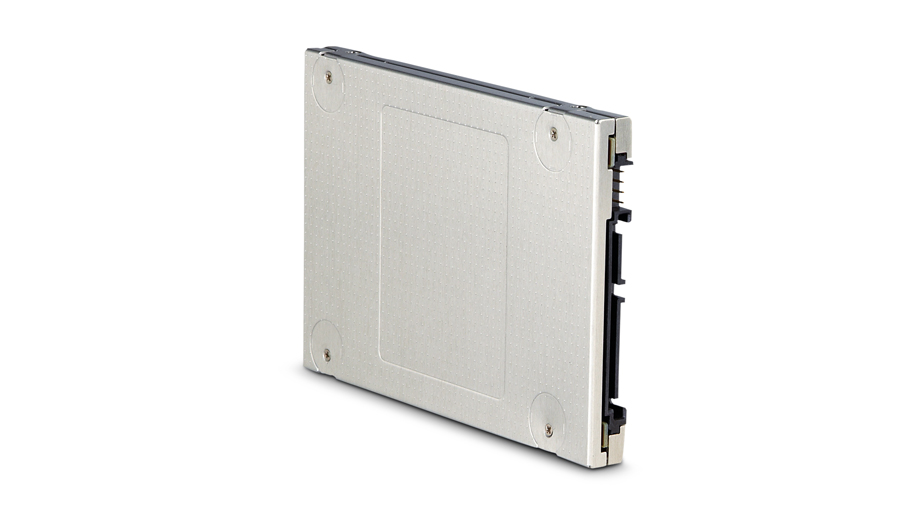TechRadar Verdict
Pros
- +
Solid straight line performance
- +
Good results in application tests
Cons
- -
No DRAM cache affects random read/write performance
Why you can trust TechRadar
Super-small Phillips-head screws can be awfully fiddly, and on this occasion a quartet of the blighters get in the way of us cracking open the shiny new Toshiba Q Series 256GB. It's the first we've seen of the thing, and as Toshiba isn't hugely forthcoming with some of the drive's key specs, we need to open the case. And what's inside is rather interesting.
Inevitably Toshiba is using its own 19nm Toggle MLC NAND chips, but the actual controller silicon is from Marvell - with a Tosh twist. All of which bodes well for performance. And, after all, what actually matters is the drive's performance in the real world, not its on-paper hypothetical speed.
Benchmarks
4K random read performance (incompressible)
AS SSD: Megabytes per second: Higher is better
A-Data XPG SX900 512GB: 23
Corsair Neutron GTX 240GB: 23
Crucial M500 480GB: 21
Intel 520 480GB: 24
OCZ Vertex 450 256GB: 19
Samsung 840 Pro 512GB: 26
Sandisk Extreme II 240GB: 23
Seagate 600 480GB: 22
Transcend SSD720 512GB: 20
Toshiba Q Series 256GB: 18
Zip file decompression
ZIP: Seconds: Quicker is better
A-Data XPG SX900 512GB: 23
Corsair Neutron GTX 240GB: 23
Crucial M500 480GB: 23
Intel 520 480GB: 24
OCZ Vertex 450 256GB: 23
Samsung 840 Pro 512GB: 24
Sandisk Extreme II 240GB: 23
Seagate 600 480GB: 23
Transcend SSD720 512GB: 24
Toshiba Q Series 256GB: 22
4K random write performance (incompressible)
AS SSD: Megabytes per second: Higher is better
A-Data XPG SX900 512GB: 18
Corsair Neutron GTX 240GB: 50
Crucial M500 480GB: 54
Intel 520 480GB: 19
OCZ Vertex 450 256GB: 54
Samsung 840 Pro 512GB: 51
Sandisk Extreme II 240GB: 54
Seagate 600 480GB: 44
Transcend SSD720 512GB: 18
Toshiba Q Series 256GB: 45
Sequential read performance (incompressible)
AS SSD: Megabytes per second: Higher is better
A-Data XPG SX900 512GB: 505
Corsair Neutron GTX 240GB: 503
Crucial M500 480GB: 492
Intel 520 480GB: 499
OCZ Vertex 450 256GB: 504
Samsung 840 Pro 512GB: 520
Sandisk Extreme II 240GB: 515
Seagate 600 480GB: 508
Transcend SSD720 512GB: 502
Toshiba Q Series 256GB: 514
Sequential read performance (compressible)
ATTO: Megabytes per second: Higher is better
A-Data XPG SX900 512GB: 551
Corsair Neutron GTX 240GB: 556
Crucial M500 480GB: 539
Intel 520 480GB: 545
OCZ Vertex 450 256GB: 551
Samsung 840 Pro 512GB: 561
Sandisk Extreme II 240GB: 555
Seagate 600 480GB: 554
Transcend SSD720 512GB: 538
Toshiba Q Series 256GB: 552
Sequential write performance (incompressible)
AS SSD: Megabytes per second: Higher is better
A-Data XPG SX900 512GB: 298
Corsair Neutron GTX 240GB: 470
Crucial M500 480GB: 414
Intel 520 480GB: 218
OCZ Vertex 450 256GB: 497
Samsung 840 Pro 512GB: 500
Sandisk Extreme II 240GB: 468
Seagate 600 480GB: 437
Transcend SSD720 512GB: 259
Toshiba Q Series 256GB: 469
Sequential write performance (compressible)
ATTO: Megabytes per second: Higher is better
A-Data XPG SX900 512GB: 519
Corsair Neutron GTX 240GB: 506
Crucial M500 480GB: 432
Intel 520 480GB: 475
OCZ Vertex 450 256GB: 534
Samsung 840 Pro 512GB: 535
Sandisk Extreme II 240GB: 518
Seagate 600 480GB: 473
Transcend SSD720 512GB: 465
Toshiba Q Series 256GB: 519
For the most part, the new Q Series is very impressive. Sequential read performance with incompressible data of 514MB/s is very near the top of the pile and writes of 469MB/s are also far from shabby.
Slightly less stellar are the 18MB/s and 45MB/s random read and write results, respectively. That is probably down to the Tosh twist to the Marvell controller. Normally it comes with a DRAM cache, but that is missing with this drive. It doesn't affect the straight performance, but the random speed suffers.
However, the Q Series is very marginally the fastest drive in both of our real-world application tests. Normally we'd give an SSD the nod for that alone, but the tight grouping of all the drives in those benchmarks makes it clear that SSD performance has now gotten the better of those parts of our test suite. Something other than drive performance is putting a cap on the real world tests.
Technology and cars. Increasingly the twain shall meet. Which is handy, because Jeremy (Twitter) is addicted to both. Long-time tech journalist, former editor of iCar magazine and incumbent car guru for T3 magazine, Jeremy reckons in-car technology is about to go thermonuclear. No, not exploding cars. That would be silly. And dangerous. But rather an explosive period of unprecedented innovation. Enjoy the ride.
